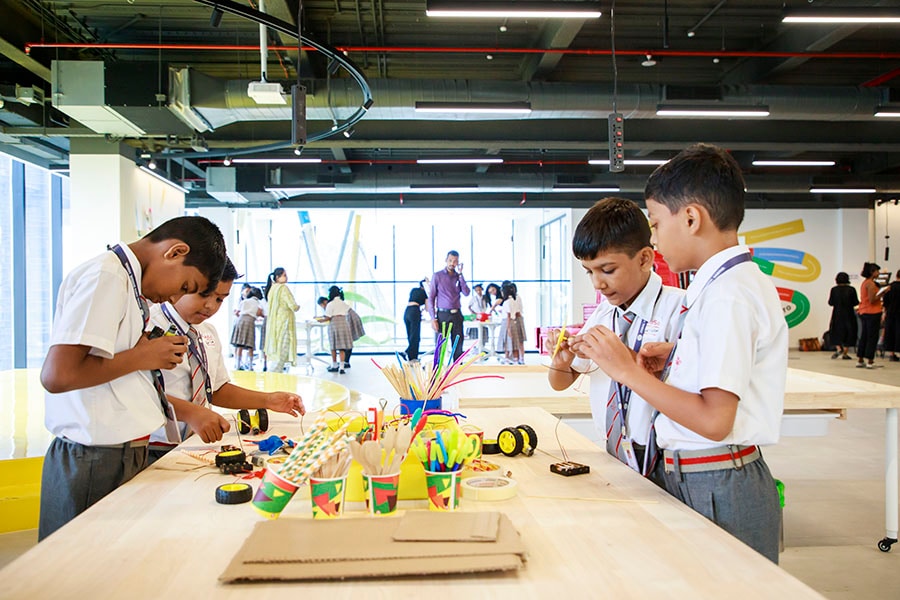'Adults have failed to solve world problems. Can we let children try?': Tanvi Ji
Jindal Shete's says that the Museum of Solutions she has curated is the world's most important museum project today. Here's how it hopes to complement schools in Mumbai


Q. What sparked the idea for having a space like The Museum of Solutions (MuSo) for children in Mumbai?
The genesis was us wanting to create a safe space and community for children. I started working on the project in late 2016, and the idea developed over the years. Initially, we toyed with the idea of having a newsroom, where children could discuss the news from their point of view, then it became a space for different hobby ideas. At the time, the maker culture was picking up in the US, and a lot of maker spaces were opening up at schools around the world, which was a huge source of inspiration for me. However, there were a couple of maker spaces for adults, but nothing for children, here in Mumbai.
From then, the idea kept morphing, from a maker space to one that could teach kids about what was going on in the world around them. I think one of the biggest things was that from the beginning, we tried to answer the question: ‘Adults have failed to solve the world’s problems. Can we let children try?’.
Q. What would you say is the role of a museum in the age of the internet, where information is freely available? And how has the definition of a museum evolved, from a building with things held in glass cases that you can’t touch?
Over the years of building this museum, we did a lot of work with children to understand what they would like. A common thing was that they thought museums were boring, and for passive viewing. We wanted to be a cross between a science museum, a children’s museum and an arts space, sort of like the World Expo that recently happened in Dubai.
So I think the definition of what should be in a museum is changing. A lot of people have created amazing, experiential spaces that are very open-ended, where children can take what they want to learn. There are three museums that have been my biggest inspirations: Olie Olie in Dubai, the Exploratorium in San Francisco and the Experimentarium in Copenhagen.
Q. Mumbai has always lacked public facilities, especially for children. How do you think an institution like yours will aid childhood development, and how accessible will it be?
We want to complement the education system we want to be huge partners to schools and really want for them to leverage this space. We want to build workshops for them, and for schools to come here multiple times a year.
When we were designing the museum, the National Education Policy had come out, and it asks for 10 ‘bag-less’ days in a year. We really want to try and get kids to MuSo on those bag-less days, and learn here. We also want to divide our visitors from across socio-economic backgrounds, and are working with different funders to get in as many children as we can at subsidised rates.
 Museum of Solutions,Victoria House,Lower Parel, Mumbai
Museum of Solutions,Victoria House,Lower Parel, Mumbai
Q. What have been your challenges so far, and what is your long-term funding plan to keep it going?
Oh, we’ve had many challenges it’s been an interesting journey. Our biggest challenge has been to figure out how to make things that are robust, such that they are not ruined in a few days. We’re still learning. We’re still building a team. We work with a lot of international consultants who advise us along the way.
So JSW was, of course, our principal funder, and this land belonged to them. So they gave us 90 percent of the funds. We also managed to rope in other corporate sponsors for different spaces so Axis Bank, Apollo Tubes, Godrej, HSBC are some of the big sponsors we have on board. We are definitely going to be fundraising with different corporates as well as philanthropists to help bring more children into the space for visits as well as workshops and programmes.
Q. What are your plans to open editions of MuSo in various Indian cities?
That’s our ultimate ambition, and there are conversations going on, but we want to wait and see how this one goes. We want to take our time, measure the impact we want to see, and think about how we can make this even better before replicating it. It’s still a very new concept for the country, so I just want to take it a bit slow.
First Published: Feb 27, 2024, 11:21
Subscribe Now